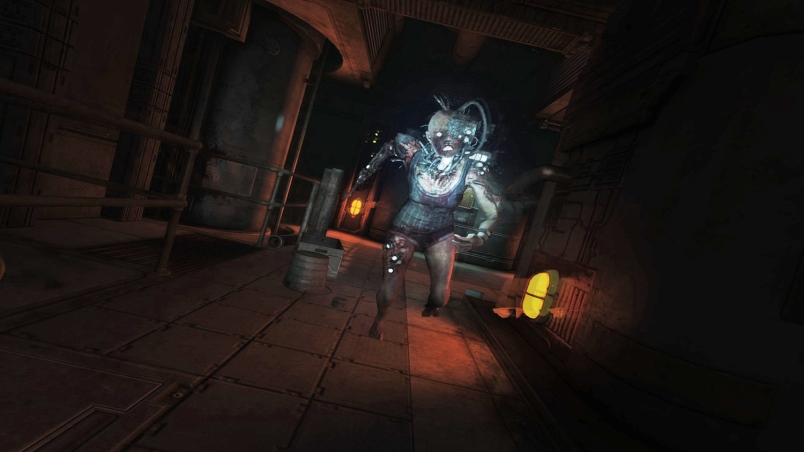It’s rare that a game comes along with a narrative hook as strong as SOMA’s. The story takes on the digitization of the human mind, and through the progression of the game and story, multiple complex quandaries about the nature of human identity are brought to light. Are we defined by our minds or our bodies? If an exact replica of our mind is duplicated in a new host, is it just as “real” as the original? Since all of the cells in our body are continually replaced over a seven year time period, does that mean that we’re essentially a completely different person than we were seven years ago?
It’s a great basis for science fiction (one that I’ve wanted to write about for some time now), and too-often ignored in favor of more well-tread ground. To see such heady subjects in a video game at all is rare, but for the game to focus itself so intently on its narrative is even more commendable. Despite its weaknesses elsewhere, SOMA stays afloat due to its excellent writing and thought-provoking moral dilemmas.
Aesthetically, the game fails to impress early on, but comes into its own later. There’s a feeling that the art design team used the original Bioshock as its basis and made slight deviations from there. Roaming around big undersea labs with hulking part-human beasts chasing you around can feel all-too-familiar for those who played Irrational Games’ classic title. Fortunately, the story and the gameplay mechanics are far different than in any of the Bioshock games, so the initial feeling of familiarity subsides.
SOMA was developed by Frictional Games, which also created the infamously-scary Amnesia titles. This is very apparent in the gameplay mechanics, which are lifted directly from the developer’s other series. Your only way to interact with your surroundings are to click on items to pick them up and manipulate them by hand, and at times you’re chased by unkillable monsters. Like in Amnesia, even looking at said monsters can be harmful to your sanity and cause the screen to distort.
To be as transparent as possible: I’m really not a fan of the “hide and look away from the monster” mechanic that Frictional Games relies on. In theory, I should love it; it plays with suggestion rather than gore or disgust, and makes the player feel powerless. But in practice, these segments just annoy me. Monsters are often dropped into areas set up as mazes, so the player has to wander around aimlessly, bumping into the monster on complete accident and having to redo work. Worse, the monster AI is largely random, meaning that sometimes one can block where you need to go and just stand there motionless for an absurd amount of time. The “fear” that Frictional Games is trying to instill is quickly supplanted by irritation, which can be extremely distancing.
These segments are even more out of place in SOMA, in which the central conceit has nothing to do with monsters. The writers have to create a whole unrelated subplot just to explain the presence of the shambling reanimated corpses occupying the bases, and the game dismisses this particular arc with very little fanfare towards the end. It feels like the developers just tacked on this plot and mechanic because it’s what they’re familiar with, rather than what actually suits the narrative. I hope that their future titles are more adventurous from a gameplay perspective.
Still, the gameplay mechanics are an afterthought here. I’ve been intentionally vague about the actual details of the story because I went into SOMA with no real foreknowledge or expectations, and I do think my enjoyment of the game came somewhat from not knowing where it intended to go. I would recommend doing the same, so if you’re a fan of Isaac Asimov, Bioshock, Amnesia, or Firewatch, take it on faith that you should give SOMA a shot.

Excellent review, Ross. Glad you finally got a chance to sit down with this title. I know we’re of the opposite mind on this but I do hate the horror genre as a rule. So it’s a testament to this game’s very strong narrative that I actually really like SOMA. Too many games eschew pure sci-fi settings in favor of more fantastical universes or perhaps even worse leave their sci-fi universes under explored, such as for the many space marine alien shooter games that only use the setting as cheap window dressing and easy to swallow context for their game mechanics.
So for that I’m very grateful we have a heady sci-fi title in SOMA.
Thanks Brandon! I think I’m more open to sci-fi fantasy than you are, but there’s definitely a glut of those kinds of games out there and not nearly enough that take advantage of the more literary aspects of great science fiction. SOMA was really cool for taking that approach.
Also, I totally see why you mentioned this in your comment on my Firewatch review now. Both try to arc out a relationship with a disembodied voice. Kind of interesting go see that emerge as a trend in gaming. I guess it’s a fairly natural extension of the “audio journals” that were in practically every game for 5 years, and this is a much more engaging way to tell story, IMO.